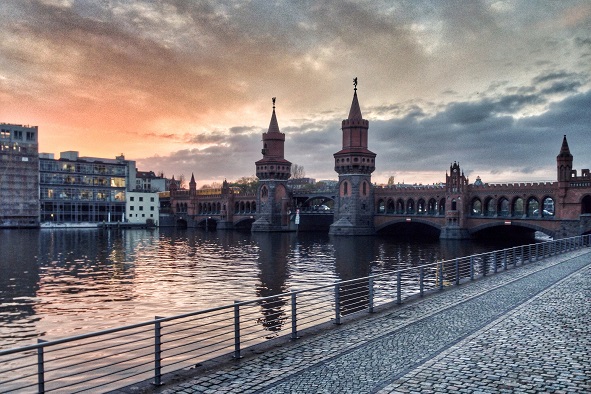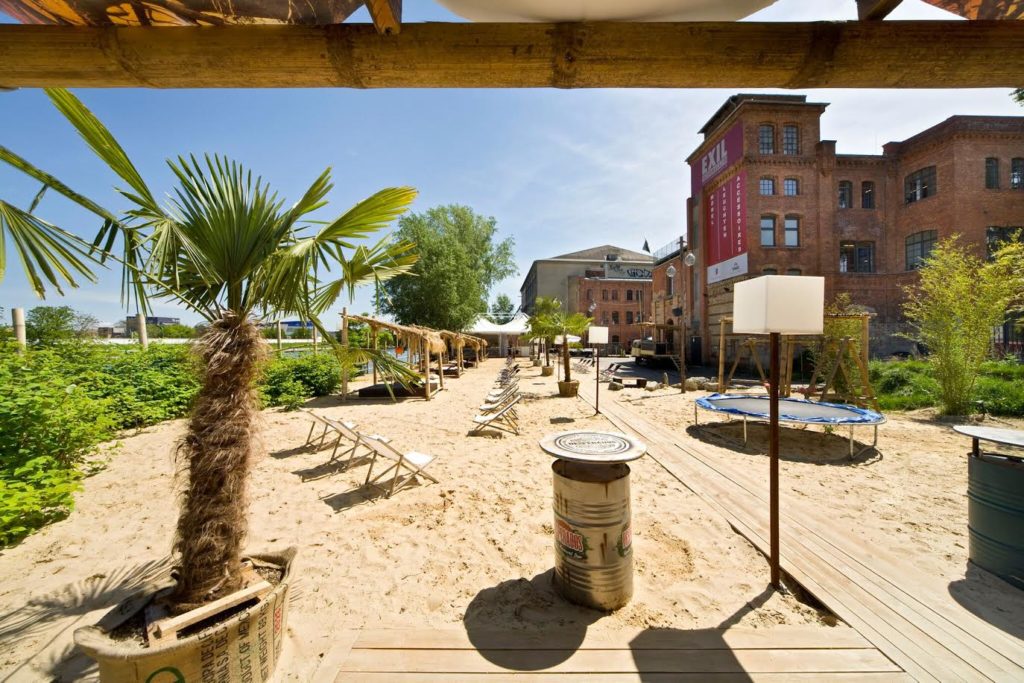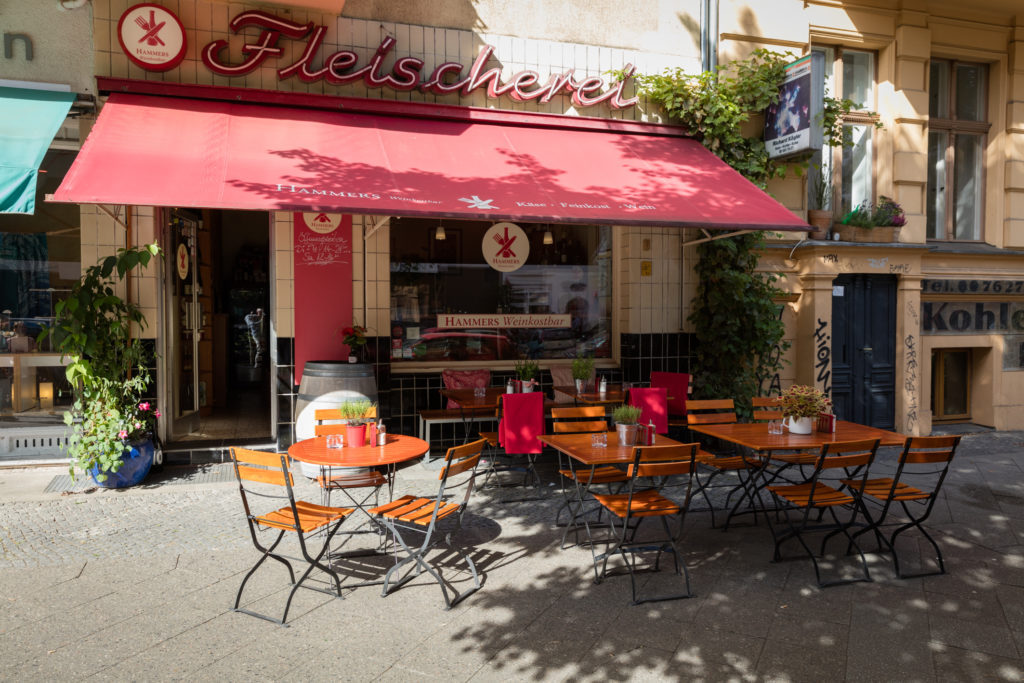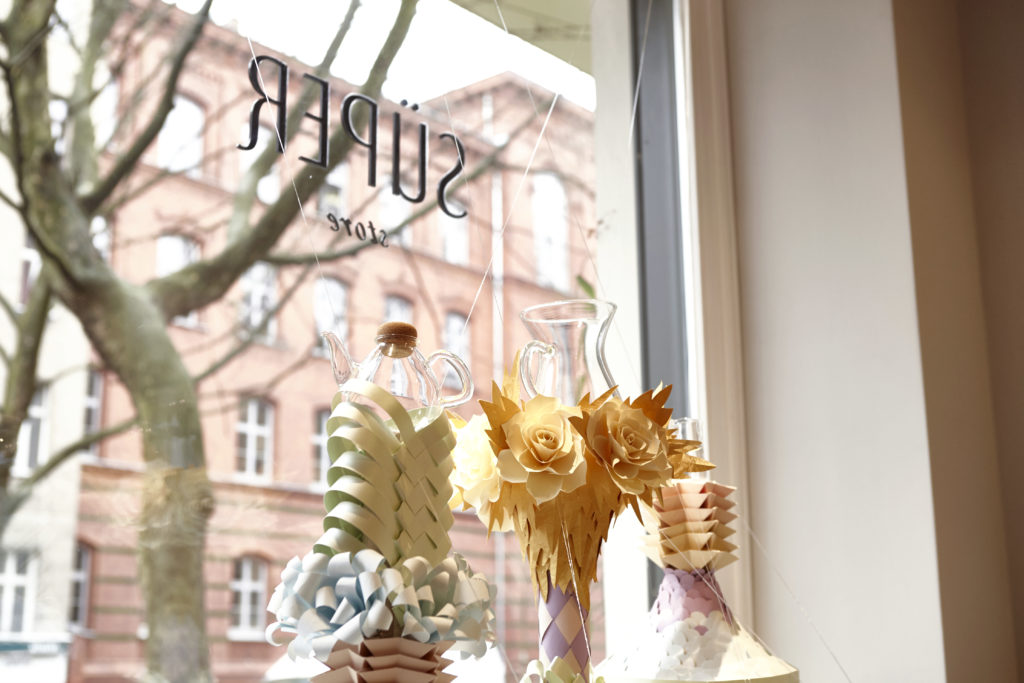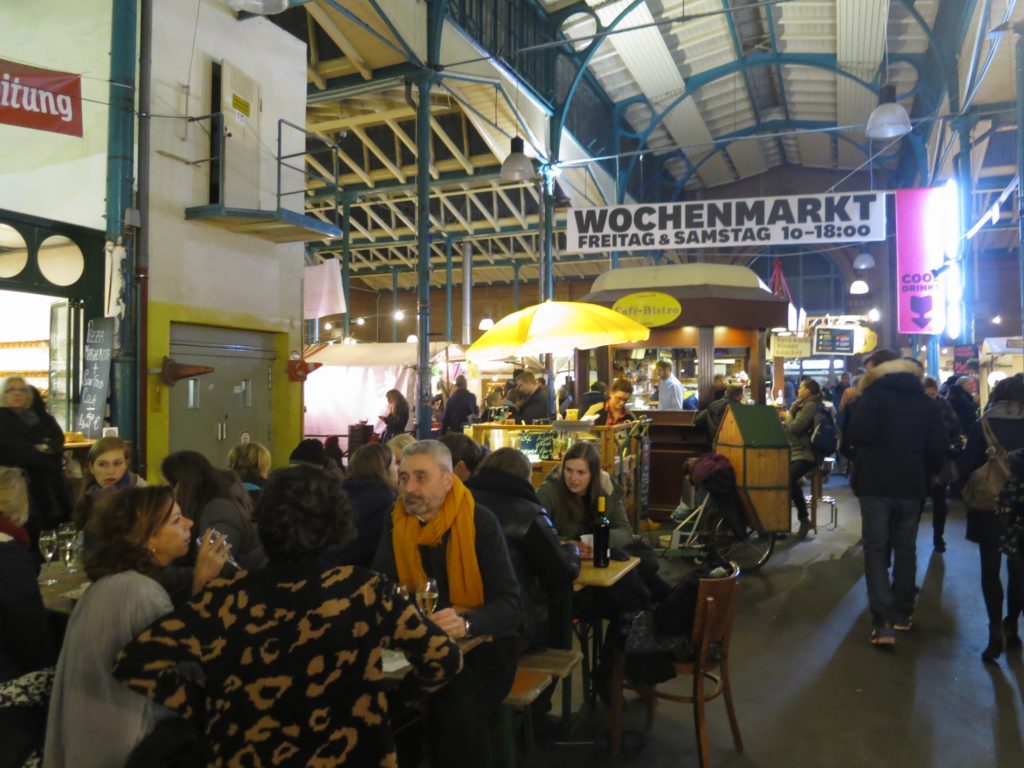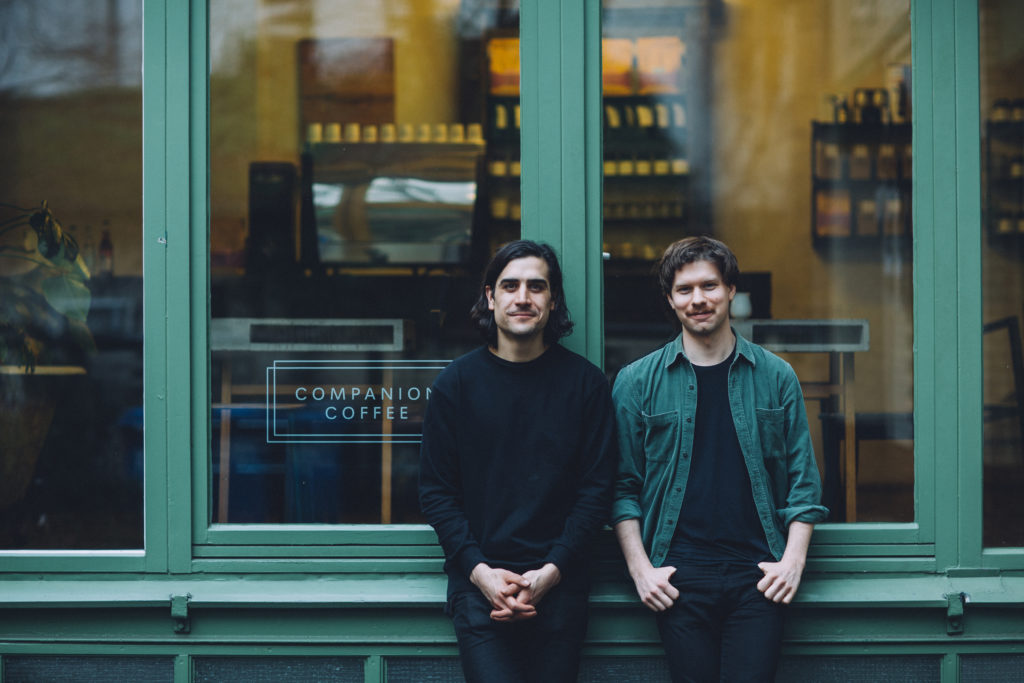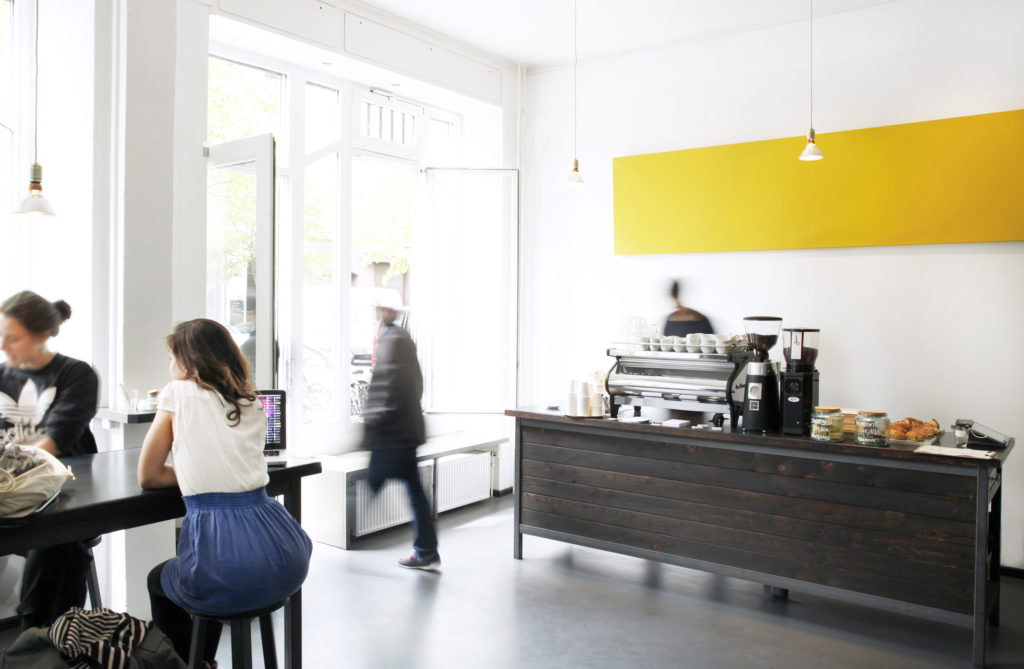Young, hip, alternative and multicultural, Kreuzberg has been long known as Berlin’s most vibrant area, where latest trends come together with its history as a working-class neighbourhood.
In divided Berlin, Kreuzberg used to be one of the poorest areas of the west zone, enclosed on three sides by the Berlin Wall. Immigrants, hippies, artists and squatters made it the most alternative and lively neighbourhood of the city, a characteristic it has kept after the fall of the wall. The area has been changing in recent years due to gentrification, with the fashionable streak slowly outweighing its counter-cultural nature, but is still setting the latest trends in the arts, nightlife and Berlin lifestyle.
Restaurants
Sage Restaurant (18-20 Köpenicker Str.) is named after a special form of sage used by some Indian tribes as a healing and spiritual cleanser. Such an approach reflects a modern, cosmopolitan take on cuisine, aimed at offering a fine-dining experience in a smart atmosphere. The ever-changing evening menu features original meat, fish and vegetarian options, while classics like salads, schnitzel, steaks and pizza are always on the list. In summer, Sage opens its sandy beach on the River Spree, to host parties with internationally-acclaimed DJs.
With its history going back to 1902, Max Und Moritz (162 Oranienstraße) is an authentic, old-style Berlin inn. The interiors still feature the original blue-green lacquered tiles, glass paintings, stucco work and wall reliefs. It’s a perfect environment to enjoy Berlin-style traditional specials, including German breakfast, smoked pork and sauerkraut, and traditional lamb stew. Tartes flambées, salads, soups and vegetarian options are also on the menu. Check their programme for dance and music events.
Another iconic Berlin eatery, Henne (25 Leuschnerdamm) proudly boasts of its history by claiming little has changed since it opened in 1908. Regardless of everything this restaurant has witnessed over the past century (the Berlin Wall used to run by just a few steps away), the house favourite is still the crispy fried chicken, cooked according to an old secret recipe and best enjoyed with a pint of German beer. Sausages and salads are also available, while the beverage menu features a few interesting items, such as herbs and bitters, liqueurs and old Berlin specialties.
Steakhouse ASADOR (22 Wilhelmstraße) is the place to go for Argentinian steaks and wines, served in a rustic and warm ambience. After a recent renovation, this renowned steakhouse increased its commitment to offering high-quality fresh produce and traditional dishes at affordable prices. By providing a great service through a down-to-earth approach, this restaurant is suitable for any occasion, be it a business lunch or a dinner for two. Located between Kreuzberg and Mitte, Steakhouse ASADOR is easily reachable both from Central and East Berlin.
Bars
Endorsed by a solid base of loyal customers, Hammers (20 Körtestraße) founders Manuela and Jürgen have been promoting fine wine in Kreuzberg since 2007. Their small, cosy shop features wine producers from Germany, Spain, France, Italy, Austria, Portugal and Slovenia, carefully sourced to meet high standards of quality and authenticity. To pair each glass with the right snack, Hammers also has a deli menu of cheese, cured meat and fish. The events list includes tasting sessions and wine presentations, to be enjoyed in a relaxed, informative and homely atmosphere.
Good beer in Germany sounds like a joyful cliché, but Berlin’s craft beer scene is not as rooted as one might expect. It has been catching up quickly in recent years though, and Hopfenreich (31 Sorauer Str.) is one of the unequivocal proofs. The taps set on vintage pipes and machinery pour over 20 different beers from Berlin, Germany and all around the world, constantly changing the options showcased. Check the Facebook page for special events and tasting sessions, while craft beer tours are always available upon appointment (for groups only).
After beer and wine there are always cocktails, and Die Legende Von Paula Und Ben (58 Gneisenaustraße) might be just the right place to complete the list. Low lighting and stylish décor create the perfect atmosphere to sit back, relax and go through the large assortment of cocktails and spirits. Gin and whiskey lovers might be pleased by the rich selection, but rum aficionados will be the happiest, with over 40 options to choose from. A fine selection of Caribbean cigars is also available.
Shops
Süper Store (12 Dieffenbachstraße) is a concept store specialising in housewares, accessories, beauty products, vintage toys and gift ideas. Founded by German designer Elisabeth Schotte and Swiss artist Vanessa Marangoni in 2011, this store sells everyday items aimed at inspiring people through a keen focus on good craftsmanship and traditional production methods. Matryoshka dolls, furniture, cosmetics, jewellery and the rest of the collection are thoughtfully arranged against the white backdrop of this refined Kreuzberg store, making it a must-visit for design enthusiasts.
Comte from France, Parmigiano Reggiano from Italy, Brandrood from Holland…Knippenbergs (15 Marheinekeplatz) lists around 120 cheeses from all over Europe. This adorably-smelly stand of the Market Hall is inspired by a true passion for cheese and a visit to it is an occasion to discover new products, recipes and local traditions from a wide range of backgrounds. “Lust auf käse” (“In the mood for cheese”), is the motto at Knippenbergs.
Another Country (7 Riemannstraße) is an English language, second-hand bookshop, where customers initially pay the full price for a book, then get a refund (minus a small fee) if and when they decide to return it. This bohemian hangout situated on the south outskirts of Kreuzberg was founded by Brit expat Sophie Raphaeline and quickly became a point of reference for culture buffs. Also used as a library and club, Another Country hosts readings, social evenings, film screenings and other cultural events.
Kräuterhaus Kreuzberg (15 Marheinekepl.) sources all sorts of medicinal herbs, noble spices, tea mixtures and essential oils from around the world. In addition to classics such as sage, nettle, St. John’s wort and birch leaves, exotic species are also on display, including mistletoe, pansy, lemon thyme from Portugal and manuka honey from New Zealand. This small shop located in Marheineke Platz Market also specialises in homeopathy, selling preparation tools, tinctures, ointment and medicinal teas.
Markets
Ninth in a total of 14 markets built in Berlin in the 19th century, Markthalle Neun (42-43 Eisenbahnstraße) has recently reopened in its historic site, 120 years after its first opening. On market days local producers sell regional and international products, but the best time to visit the market is Thursday evening, when the hall hosts ‘Streetfood Thursday’, an exhibition of amateur or semi-pro chefs featuring their specialties from all over the world. The third Sunday of each month is ‘Breakfast Sunday’, a feast of handmade breakfast delights.
Not the typical Berlin market, the Turkish Market (1-13 Maybachufer) is a small street just off Kottbusser Tor where dozens of stands line up on Tuesdays and Fridays. Extending for half a mile in the heart of the historic Turkish community, the stalls sell fruit and vegetables, cheese, sweets, household items, leather goods and electronics. Street food is also on display, with highlights including Anatolian stew, Jalapeño Börek and Gözleme (stuffed pastries). All of it spiced up by unexpected finds and some haggling here and there.
Trödelmarkt (Marheinekepl.) literally means ‘junk market’, but can be alternatively translated as “street bazaar showcasing intriguingly-bizarre items, apparently-useless bric-a-brac, clothing, CDs, books, art, antiques and all sorts of second-hand things one might think of”. Open on Sundays, the market never gets too crowded, despite having grown in popularity in recent times, and it can still be referred to as a local gem. In other words, Kreuzberg’s flag flies high in the ‘flea markets’ category too.
Coffee Shops
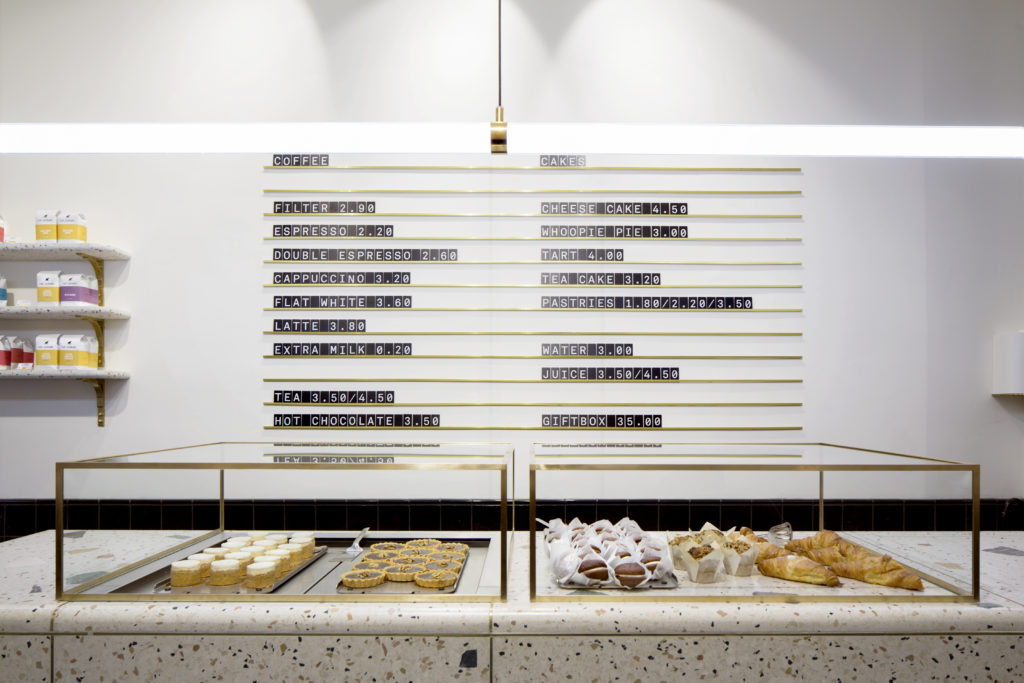
Five Elephant’s counter (Photo: Magnus Pettersson)
As a result of its growing ambitions, Five Elephant (101 Reichenberger Str.) has recently rebranded and moved to a new space, which functions as a micro roastery, bakery and café. Beans are directly sourced from Kenya, Colombia, Brazil, Guatemala and Colombia, their journey being carefully monitored from the farm to the cup. The minimal interior decoration provides a relaxing ambience which encourages long stays rather than quick pit stops. The variety of cakes served might be just one more reason to indulge. Outside tables are also available.
Tucked away in a courtyard off Oranienstrasse, Companion Coffee (24 Oranienstraße) is housed in Voo Store, coming across as the perfect excuse to take a break from fancy clothing and accessories. The keen focus on high-quality espresso drinks (no filter coffee served) entices customers to the area just for the coffee. Companion’s raw materials constantly change, sourced from a trusted network of roasters. The two founders frequently lend their experience to those seeking training in the coffee industry. Tea lovers will also find their comfort zone here, as Companion runs its own label of seasonal, ethically-produced teas.
In the heart of Kreuzberg’s Turkish community, Nano Kaffee (14 Dresdener Str.) is one of the most recent debutants in Berlin’s third-wave coffee movement, which has increasingly drawn attention to high-quality coffee and to the stages of its production process. Despite its young age, the café has already earned a lot of popularity, which it seeks to foster by hosting regular workshops and community events. In its trendy, minimal space, Nano promotes both German and international roasteries.
Galleries
Originally founded in Shangai in 2008, Fellini Gallery (6 Mittenwalder Str.) opened its European branch in Kreuzberg. Inspired by the work of the great Italian director, the gallery includes painting, photography, sculpture, performance and new media, showcasing both established artists and new talents. After almost ten years of activity, Fellini stays true to its original concept, which seeks to create a gathering point for artists and art lovers by holding regular events in collaboration with museums, chambers, libraries and other international galleries.
DUVE Berlin (94 Gitschiner Strasse) pursues an interdisciplinary approach to the arts with a specific interest in commercial culture, architecture, self-identity and imagination. As a result, the gallery not only features artists delivering an original aesthetic, but it also promotes off-site projects, concerts and screenings. Abstract painting and conceptual art remain however the main focus of DUVE. The gallery was founded in 2007 by current owner Alexander Duve and Birte Kleeman, and later moved to its current location in the heart of Kreuzberg.
Helmut Hamm has been buying and selling film posters for over 20 years. Cinema enthusiasts might have already heard about it, since the posters are available for sale online, but once in Berlin they can visit Hamm’s collection at the Movie Poster Gallery (21 Pücklerstr.), five minutes away from Görlitzer underground station. The showroom displays only original pieces made for cinema advertising, and initially not intended to be sold to the general public. Highlights include King Kong, Apocalypse Now, various James Bond films and La Dolce Vita, the latter being worth over 20,000 €.
